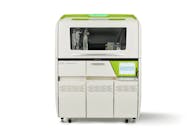Using self-administered cognitive test in primary care offices increased early diagnosis of cognitive disorders by six times
The free Self-Administered Gerocognitive Exam (SAGE) developed by Ohio State researchers is designed to detect early signs of cognitive, memory or thinking impairments. It evaluates a person’s thinking abilities and helps physicians to know how well their brain is working.
Researchers at The Ohio State University Wexner Medical Center and College of Medicine have found that the practical and brief SAGE test was easily incorporated into primary care providers’ visits.
Study findings are published in the journal Frontiers in Medicine.
“Among those who were given the SAGE test, new cognitive disorders were diagnosed by the primary care provider in 9% of patients, whereas among people who did not take the SAGE test, these disorders were only identified in 1.5%. So there was a sixfold increase in detection of new cognitive disorders based on the use of this self-administered, practical-to-give cognitive assessment tool,” said Douglas Scharre, MD, director of the division of cognitive neurology at Ohio State Wexner Medical Center and lead author of the study.
A total of 86% of the primary care providers who engaged in this study said they would recommend using SAGE to their colleagues.
The study was conducted with patients 65 and older in two primary care offices at Ohio State Wexner Medical Center.
“We took 100 consecutive patients that were never diagnosed with any cognitive disorder, coming in for just a routine visit. Then we took an additional 100 consecutive patients and gave them the SAGE test. And then we compared whether that increased the discovery or the identification of new cognitive disorders,” said Scharre, who is a professor of clinical neurology and psychiatry in the department of neurology at Ohio.
The SAGE test appears to identify cognitive impairments in individuals at an earlier time point than when SAGE is not used. Catching patients in the early stages of impairment is when medications are the most effective.
“In our study we identified 9% of patients that I think we're catching at an early stage,” Scharre said. “Therapies always work better the earlier you start them no matter what the cause of the cognitive impairment is.”
The pen-and-paper SAGE test or its digital version BrainTest are brief and self-administered. They can be used by patients in their provider’s office or at home. Trained individuals are not required to administer the test that assesses different parts of the brain.





